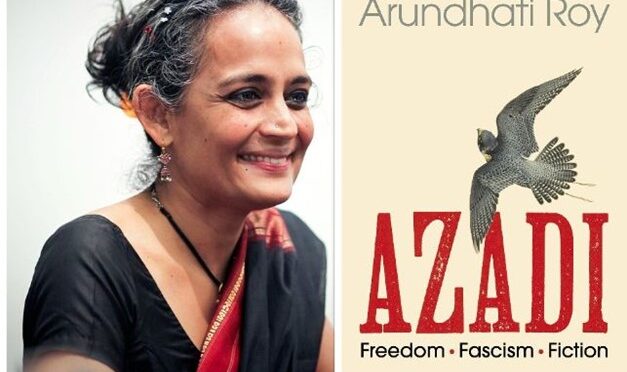Contextualising Arundhuti Roy’s Azadi: Freedom, Fascism and Fiction
Posted on : April 18, 2022Author : Olivia Bannerjee

Abstract:
Azadi: Freedom, Fascism and Fiction tries to recreate and deconstruct arguments around the socio-political scenarios, from lexical invasion, to the Kashmir conflict, and the pandemic situation.
Man Booker Prize Winner, Arundhuti Roy’s latest publication, ‘Azadi: Freedom, Fascism and Fiction’ captures the political conflict in 21st century India. The growing polarisation of ideology remains the crux of her discussion and catches the cry for ‘azadi’ (real unrestrained emancipation) of the Indian commoners. Her nine most-acclaimed public speeches and published articles have been brought together to encapsulate the voicing of ‘Freedom, Fascism and Fiction’.
With a well-known activist background the author critiques and demonstrates arguments of public interest in the Indian context. The book reflects contradictions in Indian geopolitics, citizenship rights under the NRC-CAA era of 2019, the contemporary Kashmir conflict after the revocation of Article 370 and 35A, and also the complications due to the ongoing pandemic. Collection of nine essays deconstruct the language politics in India, the Kashmir issue and the role of public media in India.
Combating the Politics of Language
In the first essay, ‘In What Language Does Rain Fall Over Tormented Cities?’, she dwells around the idea of how supremacy of Hindi and English were accepted for communication over multiple linguistic dialects in our country. More than submitting to the English western hegemony invading public spaces, Roy acknowledges the present use of English, as a ‘link-language’. Posed by the concerns of western colonialism, where English has got its place everywhere, from governmental sectors, to private connections, today its constant application limits itself to the practical solution of easing conversation with people of varied mother tongues. Roy does not restrain herself to discussing the concerns of the Western lexical invasion, but mentions the invasion of Devanagari scripts, concluding the demise of the use of Urdu. She links this with an attempt to justify the current Hindustan hegemony and its celebrated practice. Challenging the concerns of the Indian language politics, she speaks of multilateral lexical approach, by cheering a native slogan from Kerala, Swathanthryam, Javadhipathiyam, Socialism Zindabad which translates to ‘Freedom, Democracy, Socialism long live!’ This is the cry for freedom, unfettered and real, where people speaking in different voices come together to stand against oppression.
Answering the Kashmir issue
In the context of the Kashmir conflict, she takes a holistic approach providing substantial reason for her sympathetic support to the people of Kashmir, both the Muslim and the Pandit community. Her justification to stand for the movement was brought about by focusing on how the army, state surveillance and interference affected the lives of the people. Simultaneously, the pulsating articulation pushes the readers to think twice before tagging Kashmiris born into war as ‘terrorists’. She argues against the prolonged lockdown and the arrest of political leaders thereby closing the narrow bridge of connection between the population and the Indian government.
Fiction as a Resistive Tool
For the section analysing the role of public media, she begins with how the ‘neoliberal evangelicals’ manipulate the present media agencies to divert and propagate news of their own choices. In this era Arundhuti Roy believes that fiction can act as a ‘defense mechanism’ against fake news. She proposes the idea of fictional characters dissecting reality, which is similar to the imagination of the Turkish-British writer, Elif Shafak, where fiction transcends all restraints (Shafak, 2010). But her proposal of fiction acting as a resistive tool, comes with a flaw of being counter-productive, and being perceived by the mass as an ‘imagined reality’ or a ‘fairy-tale myth’. (A. Patel, 2018).
Solidity of Arguments
Arundhuti Roy is able to capture the ‘how’ and ‘why’ behind the polarisation in today’s India. However, as NS Gundur quite aptly states, ‘It lacks the very nature of an ideal critique, the practice of not only showing what is wrong with the object of criticism, but also accounting for why things are the way they are.’ (2021) Azadi, feels like a book of record fashioned with witty, poetic rhetoric and polemics, offering content to only international readers. For people living in India, it fails to make the readers think of the socio-political concerns. It engages with public concerns, but remains insufficient it its analysis of solutions.
References
Roy, Arundhati. Azadi: Freedom, Fascism, Fiction. , 2020. Print
Ghadiali, Ashish, Azadi by Arundhati Roy review – at her passionate best, The Guardian, October 2020.https://amp-theguardian-com.cdn.ampproject.org/v/s/amp.theguardian.com/books/2020/oct/19/azadi-arundhati-roy-review-kashmir-india?amp_js_v=a6&_gsa=1&usqp=mq331AQKKAFQArABIIACAw%3D%3D#aoh=16480578846810&referrer=https%3A%2F%2Fwww.google.com&_tf=From%20%251%24s&share=https%3A%2F%2Fwww.theguardian.com%2Fbooks%2F2020%2Foct%2F19%2Fazadi-arundhati-roy-review-kashmir-india
Khan, Nahaly N. In ‘Azadi’, Arundhati Roy explores the many layers of freedom. The Daily Star. November, 2020.https://www-thedailystar-net.cdn.ampproject.org/v/s/www.thedailystar.net/book-reviews/news/azadi-arundhati-roy-explores-the-many-layers-freedom-2001397?amp_js_v=a6&_gsa=1&&usqp=mq331AQKKAFQArABIIACAw%3D%3D#aoh=16480578846810&_ct=1648057966067&referrer=https%3A%2F%2Fwww.google.com&_tf=From%20%251%24s&share=https%3A%2F%2Fwww.thedailystar.net%2Fbook-reviews%2Fnews%2Fazadi-arundhati-roy-explores-the-many-layers-freedom-2001397
Mohan, Arjun S. Azadi – A Thickly Political Reading. StandPoint. March, 2021.
https://www.standpointindia.in/articles/book-review-azadi-a-thickly-political-reading
Gundur, N. S. ‘Azadi: Freedom. Fascism. Fiction’ review: An incomplete critique of present-day turbulence. The Hindu. January, 2021.
Shafak, Elif. The politics of fiction. TED.com. July, 2010.
https://www.ted.com/talks/elif_shafak_the_politics_of_fiction?language=en
Patel, Aakar, To be a right-wing intellectual in India. Live Wire. July, 2018. https://www-livemint-com.cdn.ampproject.org/v/s/www.livemint.com/Leisure/hN3sd8yxA0yu23wAzhTgMK/To-be-a-rightwing-intellectual-in-India.html?amp_js_v=a6&_gsa=1&facet=amp&usqp=mq331AQKKAFQArABIIACAw%3D%3D#aoh=16480587614390&referrer=https%3A%2F%2Fwww.google.com&_tf=From%20%251%24s&share=https%3A%2F%2Fwww.livemint.com%2FLeisure%2FhN3sd8yxA0yu23wAzhTgMK%2FTo-be-a-rightwing-intellectual-in-India.html
Olivia Banerjee
Intern. Asia in Global Affairs
The views, thoughts, and opinions expressed in the text belong solely to the author, in his personal capacity. It does not reflect the policies and perspectives of Asia in Global Affairs.





Leave a Reply